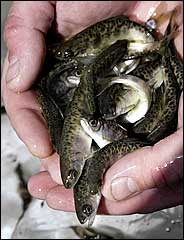forum
library
tutorial
contact

Bush Proposal Not Good for Wild Fish
by Richard K. SimmsSeattle Post-Intelligencer - November 24, 2004
|
the film forum library tutorial contact |

|
Bush Proposal Not Good for Wild Fishby Richard K. SimmsSeattle Post-Intelligencer - November 24, 2004 |
 Why do fishermen fish? For the men and women I know, it's not about the numbers of fish we catch. The real reason we roll out of bed at the crack of dawn on cold, rainy winter mornings and drive out to favorite rivers like the Hoh, Skagit or Stillaguamish is because in our hearts we're after one thing -- those rare, wonderful wild salmon and steelhead that grace the waters of this place we call home.
Why do fishermen fish? For the men and women I know, it's not about the numbers of fish we catch. The real reason we roll out of bed at the crack of dawn on cold, rainy winter mornings and drive out to favorite rivers like the Hoh, Skagit or Stillaguamish is because in our hearts we're after one thing -- those rare, wonderful wild salmon and steelhead that grace the waters of this place we call home.
Wild salmon and steelhead represent all that is good and beautiful about Washington: clean water, free-flowing streams, lush forests, insects, wildlife -- the whole web of life that, as any attentive fisherman knows firsthand, is interconnected. Wild salmon and steelhead connect us to truths much bigger than ourselves. Born naturally in streams, they travel hundreds of miles in the ocean before returning back to their home streams to spawn. Wild salmon and steelhead fill us with wonder, and when we're pursuing them with a rod and reel, they can give us the thrill of a lifetime.
That is why the fishermen I know are at once baffled, insulted and angered by the Bush administration proposal to lump wild salmon and steelhead together with hatchery fish raised in concrete tanks.
Don't get me wrong -- I've caught my share of hatchery-bred salmon and steelhead. Hatchery fish have been a big part of the fishing experience in the Northwest, but, unfortunately, not always to the benefit of wild fish populations. Perhaps hatchery practices can be reformed so that hatchery fish can coexist safely with wild fish; the Wild Steelhead Coalition supports those efforts. But hatchery fish should never -- as the administration proposes -- be counted as equivalent to wild salmon and steelhead in deciding what species should be protected.
If the administration's policy were implemented, it would seriously erode protections for wild salmon and steelhead under the Endangered Species Act. Absent these protections, salmon and steelhead streams would be open to more destructive logging, development, agricultural practices, damming and overfishing. These are the reasons salmon and steelhead had to be listed as endangered in the first place.
The essence of this proposal has been with us for more than a century -- that we can pump our rivers full of hatchery fish to replace what's been lost in wild salmon and steelhead production. Yet for more than 100 years, hatcheries have never realized such lofty promises. The new NOAA Fisheries policy to equate hatchery and wild salmon threatens to weaken the common-sense land-use and clean-water protections needed to sustain healthy rivers and fish populations.
This is a case of politics trumping science, with the interests of industry winning out over those of fishermen and others who value a healthy environment. NOAA Fisheries asked some of the nation's top scientists to weigh in on the policy, but when the scientists responded and said hatchery salmon and wild salmon should not be counted together, the administration ignored scientists.
The scientific community has been loud and clear in its opposition to the proposed policy and in its insistence that when it comes to salmon and steelhead recovery, hatcheries are no substitute for healthy rivers.
The Bush administration is taking a narrow-minded, short-term view with this policy. Haven't we learned over the past 100 years that hatcheries and other techno-fixes aren't the answer to our problems? Haven't we learned that we can't mask real problems with Band-Aid solutions? Haven't we learned that in order to recover abundant, sustainable wild salmon and steelhead runs, we need healthy habitat first?
If we want our grandkids and great-grandkids to be able to fish for wild salmon and steelhead, we need to protect wild native fish in healthy streams, not hatchery fish in concrete raceways. Ultimately, salmon and people need the same things -- healthy rivers and clean water. The administration should take the advice of its own scientists and drop this harmful policy. And it wouldn't hurt to listen to some fishermen, too.
learn more on topics covered in the film
see the video
read the script
learn the songs
discussion forum
